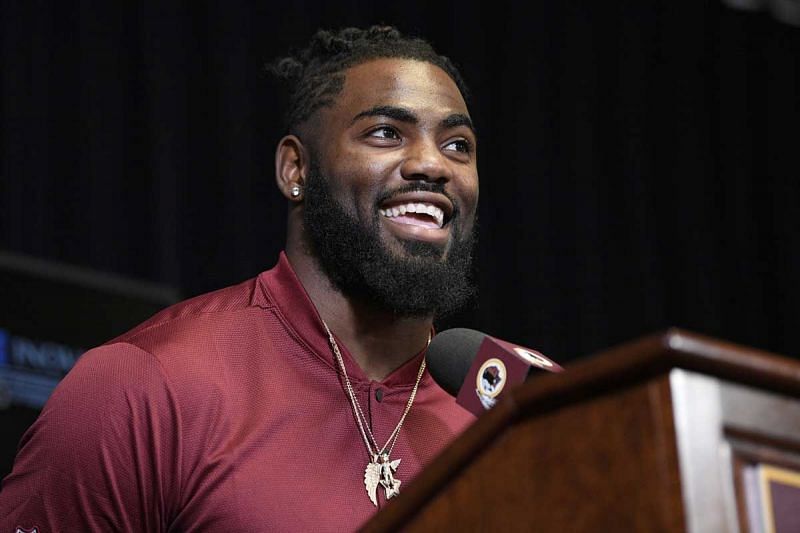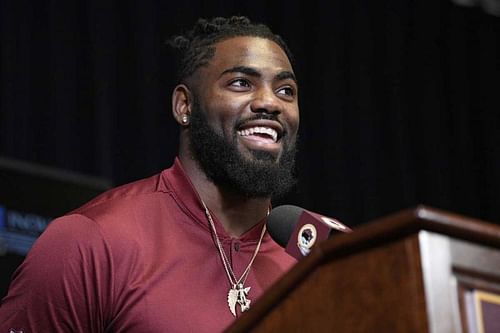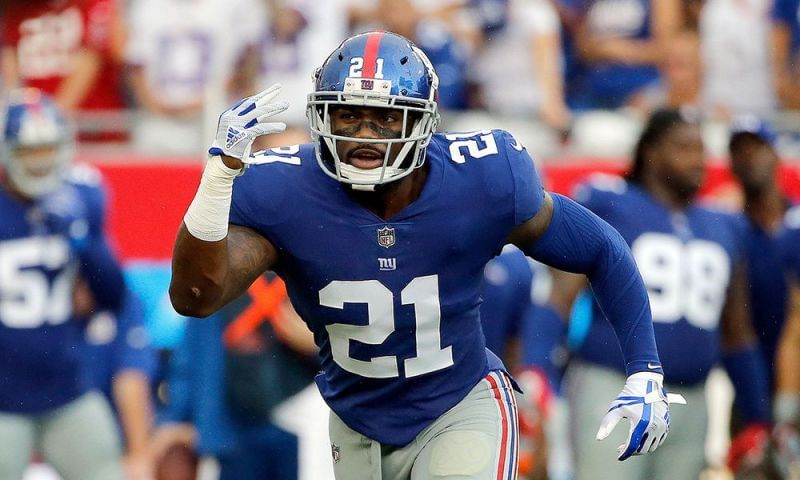
Landon Collins’ Critical Interview shows New York Giants at Another Crossroad

The New York Giants begin their voluntary OTA’s this week following what has been one of the most tumultuous offseasons in the NFL.
With ownership and management seeing a “culture problem” within the locker room preventing the team from succeeding on and off the field, key, talented players were sent off to new squads for almost nothing in return.
This year’s draft saw the Giants put their faith in a less accomplished quarterback from Duke with coaching connections to Eli Manning to be the heir apparent to the two-time Super Bowl champion.
All these moves occurred during a time when the team had a motto of rebuild yet simultaneously compete at the highest possible level. Unsurprisingly, their version of following that motto has been nothing but contradictory and has left the Giants at a crossroads.
That crossroads being preserving the players who make a real impact and having a true rebuild or wiping the slate completely clean in order to preserve a long-established culture considered “endangered”.
As some veteran players return to begin preparing for a new season along with rookies, such as Daniel Jones, who will have the media spotlight all over them, the Giants hope to find some fruits to their offseason decisions.
However, before they can do this, they must first deal with another issue, stemming from a former player’s recent comments, which has now brought them to another crossroads.
One of the players jettisoned by the Giants during the offseason was safety Landon Collins, now a member of the rival Washington Redskins.
Coming out of the University of Alabama, Collins was one of the most productive and hard nose defensive football players for New York over the last few seasons.
The recent decision by team management to not place the franchise tag on Collins until a new contract could be reached astounded Giants fans and raised abundant criticism.
Now, a couple months after his departure from the team, Landon Collins decided to voice his take on the reasoning for the slew of offseason moves the Giants made, including the one involving him.
What he said revealed something striking about the current state of affairs within the Giants organization.
In an interview with ESPN’s Sam Alipour, Redskins safety Landon Collins highly criticized the way in which the New York Giants were going about their current “culture change” and expressed his belief that the team was jettisoning star players due to their being too vocal and having extensive media and social platforms through which that voice could be reached.
According to Collins, players like himself, Damon Harrison, and Odell Beckham Jr were speaking up too much about the internal struggles and unsolved problems within the Giants roster and locker room and the team’s higher ups did not like it.
Despite the viewpoint that it was done selfishly to bring extra attention to themselves, however, he claims that it was done for the sole benefit of the whole team.
“I know with myself, [Harrison], Odell, [Vernon], all we wanted to do was win, and we spoke up because we had to get them to listen to us,” Collins said. “We had to get them to get us winning pieces to help us at least be contenders.”
Things would eventually reach a point where Collins and his teammates’ platforms became much more valued than the Giants’ and they would become the faces behind everything in the Giants organization.
Anything that was said through their platforms, whether good or bad and whether justified or not was treated as the reality of the team’s situation, even if the reality portrayed by the team was the same. This trend was not accepted by the team management and it led to the players’ departures.

"I think we were too vocal, and that platform was bigger than the Giants, you know, and our words stood out more. And ... if it's not good media, they don't want that kind of media."
To sum it all up, the Giants cut three of their most talented players and leaders because they didn’t want them being responsible for having the say in what the current state of the Giants organization was.
Even though if what was being said was the truth, the Giants wanted to represent themselves and defend any actions or lack thereof through ownership and GM David Gettleman.
The truth of the matter however is that they aren’t doing this, and as a result it has created a new problem to deal with after the original was believed to have been eradicated.
What is even more ironic about this whole situation is that the Giants have been an organization that has cared about the success of their team and players and has desired the best for them.
Part of doing that involves hearing out for the opinions of players who a part of the system to see what they think is working and what is not. Based upon their actions with Collins and his teammates this clearly isn’t being done.
Later in the interview, Collins even admitted that the Giants general manager wasn’t very jovial with him and select other players during his time on the roster and it was difficult to even communicate his opinions in a more personal setting. He told Sam Alipour:
"I wish he'd say something. Try to,"
"I mean, he had come around, shake your hand, say 'Good job big fella,' or something like that. But honestly, talking to him, or saying anything, having a full conversation or anything with him, nothing."
The Giants brass have been made to look like complete phonies throughout the offseason and in Landon Collins’s interview.
They’ve wanted to rebuild the team right so that they can compete at the same time, but instead they made changes to athletically solid areas and in turn created a total rebuild that requires both the team and fans to endure several seasons of mediocrity.
They want to appear committed to the cause of turning the team around and want players to offer their two cents of how they can. Yet as soon as they are not doing such things and these players start exposing them and becoming the primary promoters for change, they start waiving and trading them.
The Giants organization wants to be first in creating the realization that things are good or bad within the team and they want to be the ones that make people believe that the team needs change or not.
They want the players to help them discover this realization, but they do not want them spreading it for them and making the fans think they are the bad guys when it seems like they are not doing their part to create change.
Their actions, based on Collins’s interview, demonstrate to us that the “culture” which they’ve been trying to preserve from ruin by certain players does not even keep the players in mind anyway.
What is disappointing about that is some of the Giants’ players only want to be vocal because they want to be leaders for their team who set the tone and steer the ship in the right direction, just like ownership and management should be doing. Collins told ESPN that he saw this a lot in his former highly criticized teammate Odell Beckham Jr:
"And, knowing him personally, knowing him, how he was as a person and as a brother to me, and a brother to everyone in the locker room, he made sure everybody in the locker room was smiling ... and he went out there to work, each and every day. He didn't say nothing when he came to play in a football game. He didn't say nothing when he came to practice. All he wanted to do was win."
Now the Giants, after making the obvious wrong choice when encountered with the first one, find themselves at the entrance to another crossroad that stands in the way of them rebounding into prominence in the NFL.
The crossroad is providing two options: embrace the voices of the players and allow them to be as powerful a force for change as yours or keep them silenced in order to preserve a desired culture.
The Giants organization needs to consider deeply the first route, as it will take the participation of the entire team and organization to get the franchise back to winning ways.
While the culture of the New York Giants has had its positives throughout their storied history, it has also showed that it can have negative impacts as well.
As much as showing respect and honor for the game is important, listening to your players and what they have to offer to the betterment of the team is of equal importance.
For a franchise so hung up on “culture”, there may be times where adhering to it too much could be the unseen bane of their existence.